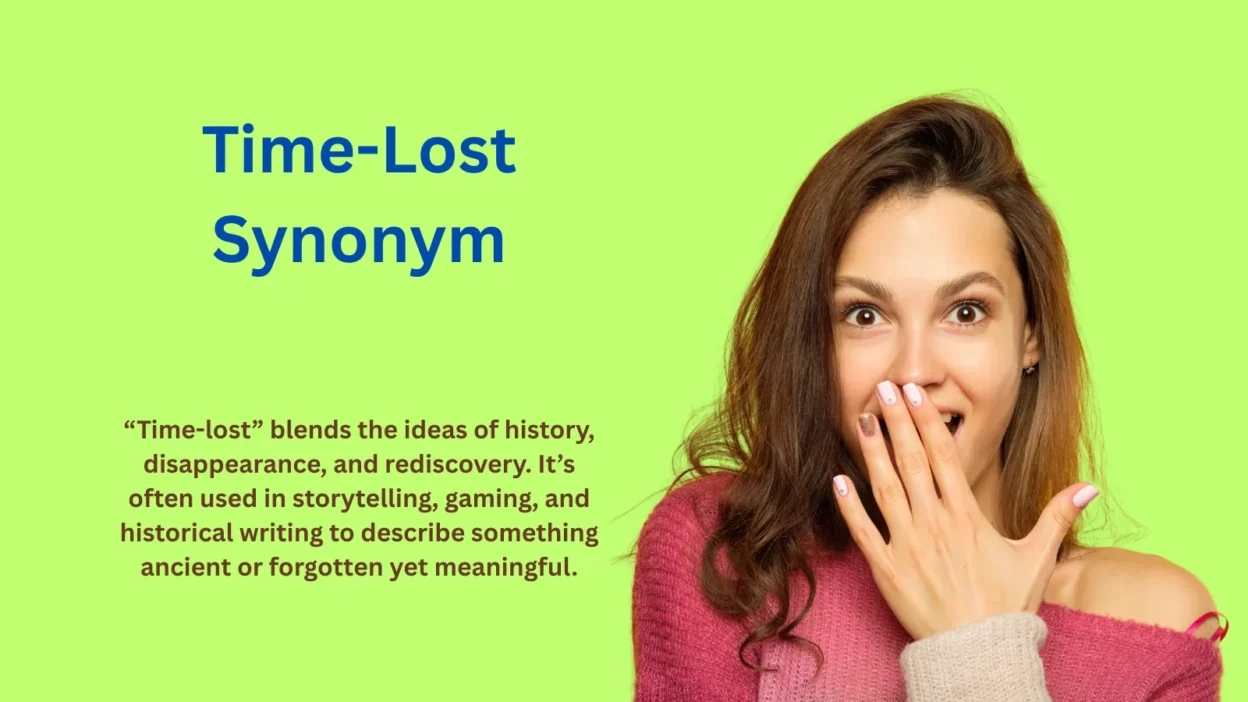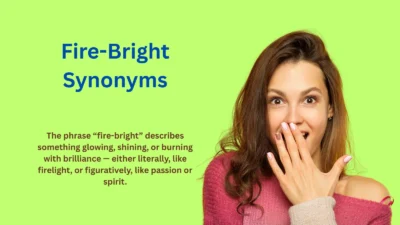Time-lost synonym words like forgotten, ancient, and bygone describe things or moments that have faded into the past, lost their presence, or vanished with time. For example, “The ruins told stories of a forgotten era,” or “It’s a bygone tradition rarely practiced today.”
If you’re writing about history, memory, or change, each word captures a unique tone — from nostalgic remembrance to complete disappearance.
In this guide, you’ll learn the meaning and example sentences for each time-lost synonym, helping you express ideas of fading, passing, and vanishing time with depth and precision.
What Does “Time-Lost” Mean?
The phrase “time-lost” refers to something forgotten, missing, or left behind by the passage of time. It evokes mystery, nostalgia, and the sense that an era, object, or memory no longer exists as it once did.
Examples:
- “They discovered a time-lost city buried under the desert.”
- “It felt like walking through a time-lost dream of the past.”
“Time-lost” blends the ideas of history, disappearance, and rediscovery. It’s often used in storytelling, gaming, and historical writing to describe something ancient or forgotten yet meaningful.
Synonyms of Time-Lost with Meanings, Examples, and Usage Tips
1. Forgotten
Meaning: No longer remembered or known.
Example: The forgotten village lies deep within the forest.
When to Use: For emotional or mysterious tone in writing.
2. Ancient
Meaning: Belonging to a very distant past.
Example: Ancient relics were found beneath the temple.
When to Use: Historical or descriptive contexts.
3. Bygone
Meaning: Belonging to an earlier time; past.
Example: It’s a reminder of a bygone era.
When to Use: Nostalgic or historical writing.
4. Lost
Meaning: No longer existing, visible, or found.
Example: A lost civilization was hidden beneath the sea.
When to Use: General use — emotional, historical, or poetic.
5. Faded
Meaning: Gradually disappeared or lost strength over time.
Example: The faded photographs told silent stories.
When to Use: Artistic or emotional descriptions.
6. Obsolete
Meaning: No longer in use; outdated.
Example: The technology became obsolete within a decade.
When to Use: Modern or technological contexts.
7. Extinct
Meaning: No longer existing or surviving.
Example: The extinct species once ruled the region.
When to Use: Scientific, historical, or emotional tone.
8. Vanished
Meaning: Disappeared suddenly and completely.
Example: The kingdom vanished from records centuries ago.
When to Use: Mysterious or dramatic writing.
9. Outdated
Meaning: Old-fashioned or no longer relevant.
Example: Outdated customs still live in small villages.
When to Use: Neutral or factual tone.
10. Antique
Meaning: Very old and valuable due to age.
Example: The antique clock was passed down for generations.
When to Use: Descriptive or nostalgic tone.
11. Archaic
Meaning: Extremely old or from an earlier time.
Example: Archaic words still appear in ancient texts.
When to Use: Literary or linguistic contexts.
12. Disappeared
Meaning: Ceased to exist or be seen.
Example: The disappeared trail led into the misty woods.
When to Use: Mysterious or historical settings.
13. Vanishing
Meaning: Gradually fading away or ceasing to exist.
Example: The vanishing traditions of old towns deserve preservation.
When to Use: Poetic or descriptive contexts.
14. Erased
Meaning: Removed completely from memory or record.
Example: The war erased centuries of culture.
When to Use: Dramatic, emotional, or historical tone.
15. Abandoned
Meaning: Left behind or neglected.
Example: The abandoned castle echoed with silence.
When to Use: Emotional or eerie description.
16. Dormant
Meaning: Inactive but capable of returning.
Example: The dormant volcano symbolizes time’s patience.
When to Use: Metaphorical or scientific use.
17. Forgotten
Meaning: Lost from memory or recognition.
Example: It’s a forgotten craft few remember how to perform.
When to Use: Emotional or nostalgic writing.
18. Hidden
Meaning: Concealed or not easily found.
Example: Hidden beneath the sands lay a lost temple.
When to Use: Mysterious or adventurous tone.
19. Obscure
Meaning: Not well known or easily understood.
Example: The poet lived in an obscure century of art.
When to Use: Academic, artistic, or historical contexts.
20. Neglected
Meaning: Ignored or uncared for over time.
Example: The neglected monument stands as a relic of the past.
When to Use: Emotional or descriptive tone.
21. Aged
Meaning: Having existed for a long time.
Example: The aged scrolls revealed forgotten secrets.
When to Use: Neutral, historical, or poetic.
22. Outmoded
Meaning: Out of fashion or no longer practical.
Example: Outmoded ideas still influence some traditions.
When to Use: Cultural or intellectual discussions.
23. Disused
Meaning: No longer being used.
Example: The disused railway is now covered with vines.
When to Use: Factual or historical contexts.
24. Relic
Meaning: A surviving object from the past.
Example: The relic symbolized a time-lost world.
When to Use: Historical, spiritual, or literary.
25. Forgotten
Meaning: Something once known but now faded from memory.
Example: A forgotten melody drifted through the air.
When to Use: Poetic or emotional contexts.
26. Overgrown
Meaning: Covered with vegetation, symbolizing neglect.
Example: The overgrown garden whispered of lost days.
When to Use: Visual or atmospheric storytelling.
27. Long-lost
Meaning: Missing or absent for a long time.
Example: The explorer found his long-lost journal at last.
When to Use: Emotional, nostalgic, or personal contexts.
28. Ruined
Meaning: Destroyed or decayed by time.
Example: The ruined walls told stories of ancient battles.
When to Use: Historical or descriptive writing.
29. Timeworn
Meaning: Showing the effects of age and use.
Example: The timeworn pages cracked as they turned.
When to Use: Poetic or visual tone.
30. Decayed
Meaning: Broken down by time and neglect.
Example: The decayed mansion stood as a shadow of history.
When to Use: Dark, descriptive, or gothic writing.
Choosing the Right Synonym for “Time-Lost”
Choosing the right synonym depends on your tone, context, and emotional intent:
| Tone / Context | Best Synonyms |
|---|---|
| Historical or Factual | Ancient, Archaic, Extinct, Relic |
| Nostalgic or Poetic | Faded, Bygone, Timeworn, Long-lost |
| Mysterious or Dramatic | Vanished, Hidden, Erased, Lost |
| Neutral or Descriptive | Outdated, Disused, Neglected, Forgotten |
| Emotional or Reflective | Abandoned, Ruined, Decayed, Forgotten |
Cultural Tip
In literature, “time-lost” often represents nostalgia, decay, or rediscovery.
Writers use it to evoke emotion and connect readers with history or forgotten memories.
In gaming or storytelling, “time-lost” adds mystery — something hidden, ancient, or existing outside normal time.
Use words like bygone or faded for soft nostalgia, and erased or vanished for dramatic storytelling.
Conclusion
Understanding the synonyms of time-lost helps you capture the emotion and essence of things forgotten, faded, or buried by history. Each synonym — whether bygone, vanished, or relic — reveals a different shade of disappearance and memory.
By choosing the right term, you shape how readers feel — wistful, curious, or haunted. These words remind us that time doesn’t erase everything; it transforms the past into stories waiting to be rediscovered.



